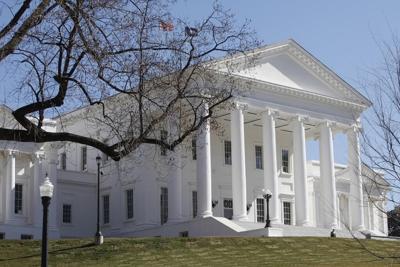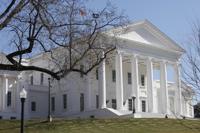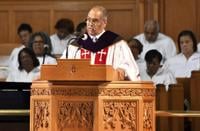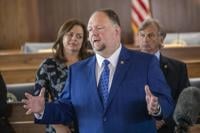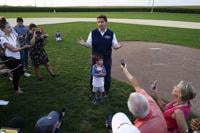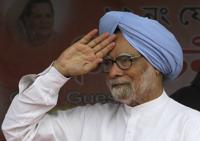RICHMOND, Va. (AP) — Virginia lawmakers plowed through hundreds of bills Tuesday as they reached a key deadline for this year's legislative session.
The House of Delegates and Senate debated topics ranging from gambling to marijuana sales ahead of what’s known as “crossover,” the point by which all legislation but the budget bills must clear its originating chamber.
This year's session marks the third since the start of Republican Gov. Glenn Youngkin's term. But it's the first since he's taken office with Democrats in full control of the statehouse after they flipped the House of Delegates in last year's elections.
Democrats have used their majorities to fend off Republican efforts to repeal previously enacted priorities, including and . And they're advancing new initiatives — including and legislation to increase the minimum wage — that could face the prospect of a Youngkin veto.
The governor has been tight-lipped, however, about where exactly he might wield the veto pen, amid over his proposal to bring two Washington pro sports teams to northern Virginia.
Still to come this session, which is scheduled to end March 9, is much of the heavy lifting on one of the Assembly's most important tasks: crafting the next two-year state budget.
Here’s a look at a where things stand on a number of other key issues:
NORTHERN VIRGINIA SPORTS ARENA
One of the session's most closely watched items, underpinning to bring the Washington Wizards and Capitals to northern Virginia, passed the House of Delegates Tuesday on a bipartisan 59-40 vote. Supporters cheered the development as a major step forward, while opponents vowed to keep up their organizing.
The deal's path forward looks murky, as an identical Senate version . Top legislators there have questioned whether Youngkin is negotiating with Democrats in good faith and raised concerns about the public-private financing that's proposed.
MARIJUANA SALES
Both have passed that would pave the way for the legal recreational sales of marijuana, but they face a skeptical Youngkin.
In 2021, Virginia , adopting a policy change that allowed adults to possess and cultivate the drug. But lawmakers have yet to enact a framework for recreational sales.
ABORTION
Democrats have defeated measures that would restrict access to abortion, that would have instituted a near-total ban on the procedure. Meanwhile, they are advancing legislation likely to face a Youngkin veto that would prevent the issuance of search warrants for electronic or digital menstrual health data, which proponents say would prevent such information from being weaponized in potential abortion-related court cases.
Democrats also used a rare procedural technique to force a floor vote Monday on a bill from a conservative freshman member that would further restrict the in which public funding can be used to provide abortion services and prohibit state funding from flowing to entities that provide abortions.
Democrats said they wanted to put every House member on the record on the issue, though the bill was not particularly divisive. It failed to advance on a vote of 95-1, with two abstentions. Republicans called the exchange a stunt.
‘SKILL GAMES’ AND CASINOS
The and this week passed differing versions of legislation that would tax and regulate so-called “skill games,” the slot-like betting machines that have in businesses such as truck stops, restaurants and convenience stores around the state before a ban took effect.
The House version has tighter regulations, and the Senate's is preferred by the well-organized industry coalition pushing for legalization.
Other gambling-related bills this year include a now-defeated effort to allow in the wealthy suburbs of the nation’s capital and a separate measure, still alive, that would of casino-eligible cities while removing Richmond, where voters have ballot measures to pave the way for one.
CAMPAIGN FINANCE REFORM
Good governance advocates had high hopes that this may be the year Virginia lawmakers finally agree to join most other states and the federal government in preventing elected officials from spending campaign donations on personal expenses.
But to do just that appears to face resistance in the House of Delegates, where Speaker Don Scott signaled skepticism about the legislation in an interview ahead of session. The was allowed to die for lack of a hearing. The , which passed 35-4, will now cross over for House consideration.
MEDICALLY ASSISTED SUICIDE
that would let Virginians facing terminal illness end their own lives with a prescription of barbiturates or other controlled substance from a health care provider narrowly passed the Senate last week. The bill limits eligibility to mentally competent adults who have received a diagnosis that they have six months or less to live.
The bill failed in previous years, but this year passed the Senate on a party-line vote after receiving an endorsement from U.S. Rep. Jennifer Wexton, a Democrat and former state senator with a terminal neurological disease. Religious and socially conservative groups have opposed the measure.
A had been scheduled for a vote in the House on Tuesday but was passed by, effectively defeating it. The Senate's version will now cross over.
LICENSE PLATE READERS
After a lengthy debate, the state Senate narrowly defeated a measure from Senate Majority Leader Scott Surovell that would regulate the use of license plate reader technology, while also opening the door for use of the cameras on state highways.
Surovell said the bill would add guardrails on a widely used technology that is currently unregulated by the state. Opponents raised privacy concerns.
Sen. Lashrecse Aird said that without tighter rules on how police can use the data, the bill would allow for an “unfettered expansion of mass surveillance here in the Commonwealth.”
A different version of the bill is still alive in the House.
____
Associated Press writer Matthew Barakat contributed to this report from Falls Church.

